#etienne leblanc
Explore tagged Tumblr posts
Text

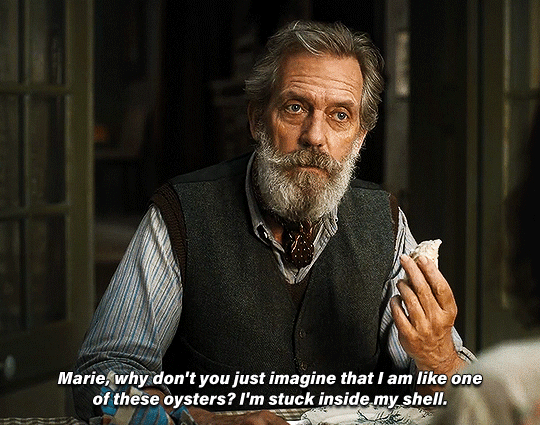
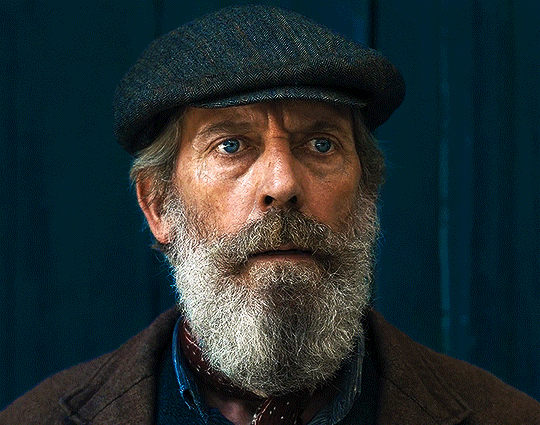
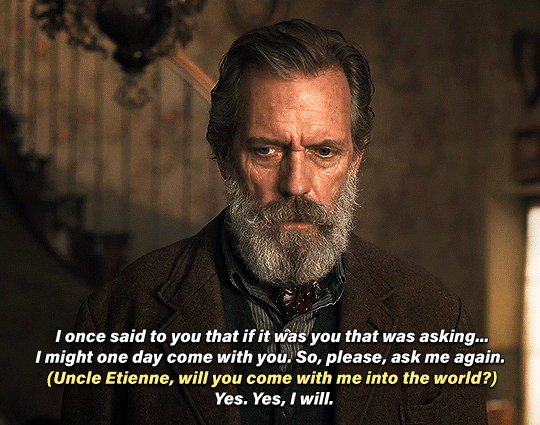
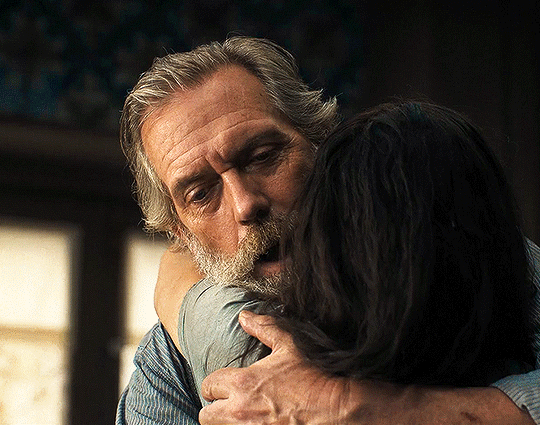
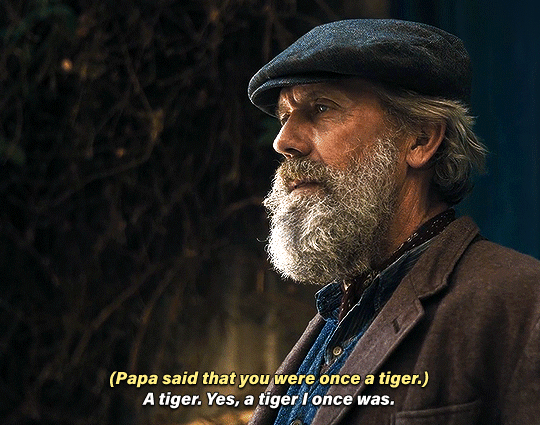
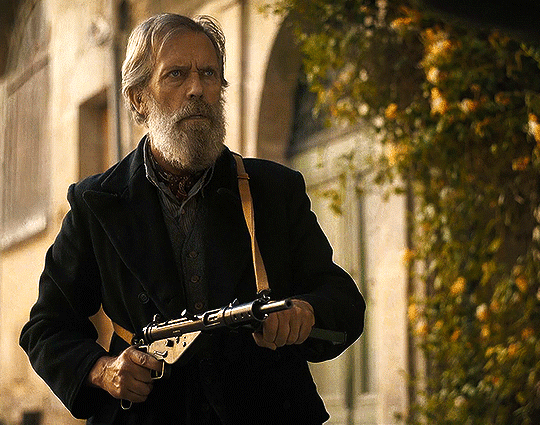


HUGH LAURIE as ETIENNE LEBLANC -> All the Light We Cannot See (2023)
The human brain is locked in total darkness. Your brain floats in a clear liquid inside the skull, never in the light. And yet, in this darkness, the world the brain constructs is full of light. It brims with color and movement. What may be the most complex object in existence, one wet kilogram within which spins the universe. So how, children, does the brain, which lives without a spark of light, build for us a world full of light?
#atlwcsedit#all the light we cannot see#atlwcs#hugh laurie#etienne leblanc#netflixedit#tvedit#filmtv#perioddramaedit#atlwcs spoilers#*#ngl i watched this show just for him 🫣#but now i really want to read the book
238 notes
·
View notes
Text
young henri: what are you writing?
young etienne: the government wants to know what kind of weapons we have in the house. i'm letting them know it's private information.
young sophié, looking over etienne's shoulder: this just says 'fuck around and find out' in calligraphy
#henri leblanc#etienne leblanc#sophié leblanc#I LOVE THEM SO MUCH IM SO SERIOUS#I WILL do a fanfic about them sooner or later#all the light we cannot see#atlwcs incorrect quotes
3 notes
·
View notes
Text

#all the light we cannot see#göremediğimiz tüm ışıklar#3.bölüm#Marie LeBlanc#kitap#Etienne LeBlanc#Madame Manec
0 notes
Text
Hugh Laurie’s 10 Best Movies & TV Shows, Ranked
By Ben Protheroe
Published Feb 15, 2024
Summary
Hugh Laurie's comedic sensibilities shine through in his deadpan expressions and impeccable timing, making him a comedic powerhouse.
Laurie's natural charisma allows him to play affable characters or charming rogues in dramatic roles, showcasing his versatility as an actor.
Laurie's most impressive skill is his ability to completely transform himself, abandoning his famous traits and disappearing into unexpected roles.
Hugh Laurie first established himself as a comedy actor, but he has also shown that he is a powerhouse performer in dramatic movies and TV shows. Laurie first rose to prominence alongside Stephen Fry, the other half of his popular double act. The duo starred in TV shows and movies together before developing successful careers on their own. Fry has become an author and a TV presenter as well as an actor, while Laurie has added more dramatic roles to his repertoire. Laurie is mostly known for his TV shows, but he has made some brilliant movies as well.
Hugh Laurie has acute comedic sensibilities, especially when playing the straight man. His deadpan expressions and trademark comic incredulity are among his best assets. However, he is also articulate and intelligent enough to make unusually verbose punch lines land without missing a beat. Laurie uses his natural charisma in dramatic roles to play a number of affable characters or charming rogues. What's perhaps most impressive about Laurie's acting skills is that he can abandon all of his most famous traits and disappear into unexpected roles.
10Peter's Friends (1992)
Roger Anderson
Peter's Friends is a somewhat forgotten comedy directed by Kenneth Branagh. Stephen Fry is the titular Peter, a man drifting through life who inherits a luxurious countryside manor and invites all of his old college friends back together for a New Year's Eve celebration. The old friends assemble from all over the globe, and their bright and shiny facades begin to crumble. Hugh Laurie plays Roger, a once-promising musician who sold out a long time ago to write advertising jingles. He's just one in a cast full of eccentrics, all of whom have a tenuous grip on reality.
9All The Light We Cannot See (2023)
Etienne LeBlanc
Based on the novel by Anthony Doerr, All the Light We Cannot See follows the lives of two teenagers caught on opposite sides of the Second World War. Marie-Laure is a blind French who uses her radio to broadcast messages of hope and resistance, and Werner Pfennig is a German soldier sympathetic to her cause but tasked with tracking her down. Hugh Laurie shines as Marie-Laure's great-uncle, a man with PTSD from the First World War who fights to overcome his condition to protect his family. All the Light We Cannot See delivers a powerful, uplifting message.
8Arthur Christmas (2011)
Steven Claus
Arthur Christmas is a festive adventure with a lot of heart and a lot of humor. Arthur is the son of Santa Claus, but he is forced to take on a delivery of his own after he discovers that one child didn't get their Christmas present. Hugh Laurie plays Steven, Arthur's business-minded older brother who wants to run Santa's workshop like a delivery warehouse or a military base. Arthur Christmas has all the charm usually associated with Aardman Animations, the studio most famous for claymation projects like Chicken Run and Wallace and Gromit.
7Jeeves & Wooster (1990-1993)
Bertie Wooster
Stephen Fry and Hugh Laurie's TV adaptation crystallized two classic comic characters for an entire generation.
P.G. Wodehouse's "Jeeves" stories have been extremely popular in Britain for decades, and Stephen Fry and Hugh Laurie's TV adaptation crystallized two classic comic characters for an entire generation. Hugh Laurie plays Bertie Wooster, a wealthy young man who is affable and optimistic but somewhat thick. Stephen Fry plays Jeeves, his intelligent valet with a sardonic wit. As Bertie tangles himself up in problem after problem, it's often down to Jeeves to extricate him from his troubles as painlessly as possible. Jeeves aims a couple of barbs at his employer, but he makes sure they sail over Bertie's head.
6The Night Manager (2016)
Richard Roper
The Night Manager pairs Hugh Laurie with Tom Hiddleston and Olivia Colman, and all three actors deliver brilliant performances. Laurie plays Richard Roper, an amoral, psychopathic arms dealer who is under investigation by the British Foreign Office. Hiddleston plays a hotelier in Cairo who is enlisted to infiltrate his inner circle. Based on the novel of the same name by John le Carré, The Night Manager is a suspenseful thrill ride with an ordinary man placed in extremely deadly situations. Hugh Laurie's performance as the villainous Roper is a great showcase for his talents as a dramatic actor.
5A Bit Of Fry & Laurie (1989-1995)
Various characters
Hugh Laurie's first TV show alongside his comedy partner Stephen Fry was the BBC sketch show A Bit of Fry and Laurie. Their deadpan British wit combines with absurdist Pythonesque sketches where Laurie typically plays the sarcastic straight man. Fry and Laurie's sketches often poke fun at the rigidity of British society by introducing elements of the surreal, and they frequently use innuendo and puns to spin ordinary situations into farce. A Bit of Fry and Laurie also gave Hugh Laurie a platform to demonstrate his talents as a musician with plenty of comedy songs on guitar or piano.
4Sense & Sensibility (1995)
Mr. Palmer
Sense and Sensibility is one of the best Jane Austen movie adaptations, starring and adapted by Emma Thompson. She plays Elinor Dashwood, one of three sisters who find themselves in dire financial straits and plot to find wealthy men to marry. Despite the jeopardy of this premise, Thompson's script captures Austen's dry wit and upbeat tone. Hugh Laurie plays a supporting role as Mr. Palmer, a comfortable member of high society whose privilege allows him to freely dispense erudite one-liners without needing to fear the repercussions. Laurie helps revitalize Austen's humor for the modern era.
3Veep (2012-2019)
Tom James
Laurie is one of very few actors in the show who can go toe-to-toe with Louis-Dreyfus in full comedic flow.
Julia Louis-Dreyfus is the star of Veep as the cynically ambitious career politician Selina Meyer, but she has an outstanding supporting cast to back her up. Veep's best seasons come after the show takes some time to assemble its funniest characters. Hugh Laurie plays Tom James, the charismatic senator who sucks all the attention away from Selina on the campaign trial, even though he is brought in as her running mate. Laurie is one of very few actors in the show who can go toe-to-toe with Louis-Dreyfus in full comedic flow.
2Blackadder (1983-1989)
Prince Ludwig the Indestructible, Prince George, Lt. The Hon. George Colthurst St. Barleigh, other minor characters
The BBC historical sitcom Blackadder hops to a new time period each season, starting in the Middle Ages and ending in the trenches of the First World War. Hugh Laurie plays a different character in each season, starting with one of the show's most cunning villains, Prince Ludwig the Indestructible, in season 2. His most memorable performances come after he joins the main cast as the upper-class twit, George. Prince George and Lieutenant George are both stupid but boundlessly optimistic, and they consistently rub Rowan Atkinson's Blackadder the wrong way.
1House (2004-2012)
Dr. Gregory House
House gave Hugh Laurie his most famous role, and he took it with both hands. The character of Gregory House is based on Sherlock Holmes. He has a genius-level intellect and remarkable powers of deduction, but he's misanthropic and he struggles with substance abuse. House's best episodes delve into obscure medical mysteries, as House and his team work around the clock to diagnose their patient. House's methods are unethical, and he often treats patients like puzzles rather than human beings, but his results speak for themselves. 20 years on, House is still an unbeatable medical drama.
#hugh laurie#screen rant#the night manager#a bit of fry and laurie#veep hbo#house md#blackadder ii#blackadder the third#blackadder goes forth
10 notes
·
View notes
Text
All the Light We Cannot See: Etienne LeBlanc [INTP 5w6]
MBTI Type: INTP Etienne has a highly abstract mind, and frames everything in terms of abstract concepts, even what he has to say about his death – that when your soul is leaving your body, you will know because your life passes before you in a series of separate images. He tells Werner to tell Marie that a tiger is happier dead than in a cage, implying that he is grateful to her for getting him…

View On WordPress
9 notes
·
View notes
Text
All the light we cannot see (Movie review)
quick note: when I say 'genre' I mean WW2 movies, this is wholly just my very much fallible opinion, I literally just watched the movie this is in no way wholly comprehensive and thought through AND I have not read the book. Oh and spoilers
I just finished 'All The Light We cannot Sea' not that anyone asked for my opinion, but it was a really cute story! I love the connection between Marie and Werner through the Professor though in terms of the romance aspect... I feel like they sort of threw away Marie's character for the sake of it. Werner being head over heels fully make sense even if it is not logical seeing as for him she is the embodiment of 13.10 and therefore all the hope, care and love that it represents. That aside, love the fact that reference was made to the elite schools. Since it's been something I'd been itching to see depicted more often in second world war era movies ever since I watched 'Napola; Before The Fall', though it is validly and naturally not referred to/depicted that often seeing as there are more interesting/important stories to tell.
Either way I do wish that the season was a bit longer there was a lot of potential in terms of building tension and suspense with Werner and the curly haired liar and there would have been more time to potentially flesh out Marie and Werner's dynamic, but then again this is probably just due to the fact that I'm comparing this to the pacing of other war series (e.g Das Boot 2018) which really take their time lathering on suspense and have a much longer run time. So, the shorter run time of this series taken into account, the pacing was simply fine. Though I liked the series over all it was in a sense (for me) truly mediocre.
The story line with Marie and her father, Etienne Leblanc's whole shebang and Werner's back story were all very interesting, but (and again this is purely and wholly my own opinion, I literally just finished the season and decided to write this no deeper thought or analysis has been put into this) the individual aspects merge, however cohesively, only to still outshine the overarching plot or rather perhaps more correctly, the present of the story. It is much more about characters going through a plotline set in a war than a war movie... If that makes any sense? The focus is very much on the past and the characters individually, much more than the current events and actions and though they are in no way unimportant or underplayed, they definitely play second fiddle in my opinion. This is more prominent in the 2nd episode onwards.
This isn't a bad thing by any means, but if you're going into this with your focus on the war aspect of the film then you won't be disappointed and not really underwhelmed but simply... well, whelmed, I suppose. I wouldn't say to go into this expecting a love story either, because it is... at least to me, not. Rather this movie is more a 'connection two people (unknowingly) share and their development and life up until they meet, oh and also its set in a war' type movie. There's a lot of focus on the softer human aspect (which we love to see) and the before/leading up to aspect, but without building a lot suspense which one may expect from a war movie (not that there wasn't suspense just not that much again in comparison to other war series like Das Boot 2018).
Somethings I really loved about this movie though was Etienne and his whole deal (simply because it's something I know and enjoy encountering in this genre), Marie and her father, like fr fr that whole storyline was actually perfect beginning to end and lastly Marie's blindness was perhaps the best most new and most refreshing and truly and addition to this genre on a whole. I'm not saying that the experience of being blind was well portrayed, seeing as I myself am not and have never been blind, but in a genre that is allergic to diversity it's always nice to see the portrayal of experiences that deviate from the 'norm'. ESPECIALLY, representation of people with disabilities and not just a oh look at this poor soldier who just got shot will never walk again we're just going to push him off screen, pretend he doesn't exist and get back to the boy with guns. I'd love to see more representation of disabled people being people and not just something to be pitied in this genre.
My biggest problem with this film is it all being in English. I love it when the respective characters speak their respective languages. But also it made some part a little unclear as to who could understand what and what language was actually currently being spoken. But that's really just me being nitpicky its fine as is just not what I prefer, lol.
Anyways all in all the series was a solid 7.5/10 and again I was beyond stoked to see more Elite school depiction and the story truly was very cute (Also if you really liked the suspense and war aspect of this series then watch Das Boot 2018 you'll love it, season 1 was prime television)
2 notes
·
View notes
Text







Tutta la luce che non vediamo (All the Light We Cannot See) è una miniserie televisiva statunitense del 2023 ideata da Shawn Levy e Steven Knight.
Marie-Laure Leblanc (Aria Mia Loberti) è una ragazza cieca che vive a Parigi con il padre Daniel. L’occupazione nazista la costringe a fuggire a Saint-Malo, ospitata da uno zio. Padre e figlia scappano portando con loro un leggendario diamante per evitare che cada nelle mani dei nazisti.
Dalla cittadina bretone, Marie legge alla radio brani tratti da 20.000 leghe sotto i mari.La trasmissione ha un duplice scopo: spera di raggiungere il padre (Mark Ruffalo), scomparso misteriosamente, e lo zio Etienne (Hugh Laurie), dai quali è stata separata, e svolge un’azione di supporto alla Resistenza, utilizzando il romanzo classico per inviare messaggi in codice alle forze alleate.
#tutta la luce che non vediamo#all the light we cannot see#shawn levy#steven knight#aria mia loberti#mark ruffalo#hugh laurie#saint malo#ww2
4 notes
·
View notes
Text
All the Light We Cannot See: In Defense of the Netflix Adaptation (Part 3)
PART 3: CHANGES - THE BAD
WARNING: SPOILER ALERTS
Okay, let’s talk changes. First, let me clarify that all the changes were, in my opinion, justifiable. Did I like all of them? No. Can I see why they were made? Yes.
That said, behold my list of the bad (but not quite ugly) changes, and why I didn't mind them.
In the book, Verner destroys the radio, much to Jutta’s dismay. In the show, Verner continues listening to the radio, against Jutta’s wishes. I actually thought this change was delicately executed. The only difference I see here is that in the show, Jutta cautions against the dangers of listening to the radio, whereas in the book, she cautions against becoming misinformed. In the end, she is still established as a voice of reason, while simultaneously reinforcing that Verner was deeply attached to the Professor’s lessons.
The journey to Saint-Mailo, where Marie and Papa steal a car instead of enduring the grueling journey by foot. Two reasons why I think this is justified, both of which are technical. (1) Time. Keep in mind that a visual platform has limited time, so context had to be condensed as much as possible. To me, this scene was meant to convey that Daniel LeBlanc had a way of creating the charm and humor out of a bad situation. We saw this throughout the book, the show conveyed it in this scene. (2) Tone. Bear in mind that the show was aiming for a more hopeful tone, so the tragedy needed to be concentrated in certain scenes. This was not one of them. Showing a long and grueling journey would have made the show lean more towards the likes of All Quiet on the Western Front.
Verner’s time in Schulpforta is condensed. This makes sense to me. Again, the show had to condense a lot of context, so it had to be done here. Nevertheless, I thought they condensed it beautifully. The scene with Verner running from his ‘traditional welcome’ was heartbreaking.
Random details - omission of the model as a puzzle, addition of von Rumpel’s lady friend and Captain Schmidt. These, to me, were just tools for condensing the story. Am I sad that the house as a model wasn’t featured? Yes. The model, to me, was a very important indicator of Marie’s cleverness. Not to mention her connection with Verner, as Verner was the only other character in the book who was able to open it. But, simply put, the show did not have space for this detail. As for von Rumpel’s lady friend and Captain Schmidt, they were just mere tools for condensing the story. The lady friend was used to explain von Rumpel’s motivations, just as Captain Schmidt was used to show how badly Verner wanted to protect Marie.
Extra nazis, and all of them were “comically evil”. I’m only mentioning this because I’ve heard this comment several times. Let me start by giving credit where credit is due. Yes, the book was masterful in portraying nuance, and that included the nazi figures in Verner’s life. The thing is, subtlety doesn’t play out as well in a visual platform. It’s a show. Condensed, visual tension was necessary. As a result, the nazi figures had to be greatly dramatized compared to the figures in the book.
Etienne is a badass. Okay, okay, I admit that even I felt iffy about this one, but I managed to make it make sense. First, keep in mind that the Etienne we met at the beginning of the show is PRESENT Etienne. He had already evolved. He’s had time to become brave. This is further reinforced by the flashback where we do see the Etienne that we knew from the book - the hermit suffering from PTSD - and we see the precise moment he grows out of it (aka “a tiger you will be again”). If anything, my only complaint is that he was already quietly involved in the Resistance by the time we meet him.
0 notes
Text


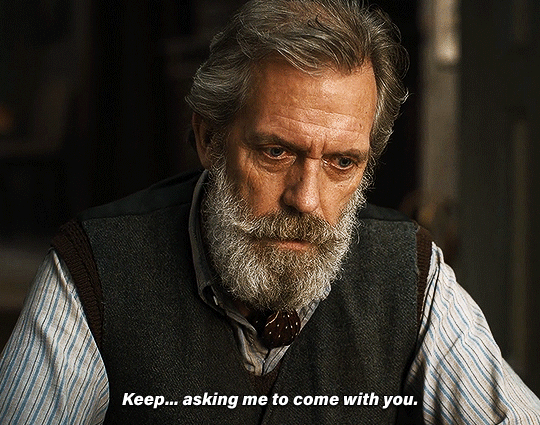

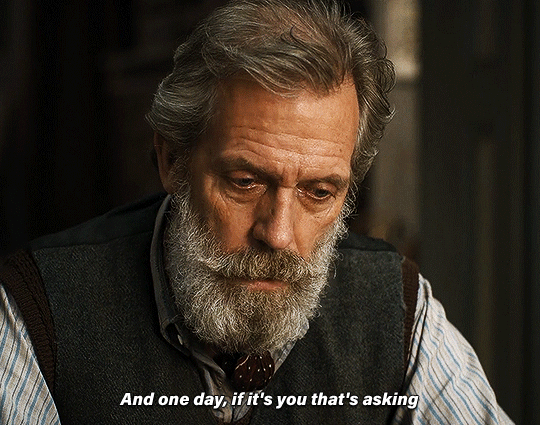
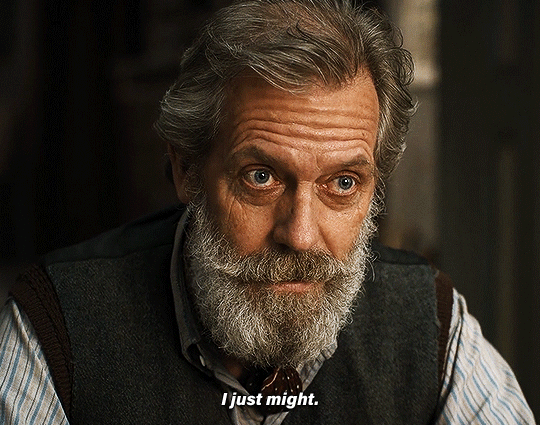
ALL THE LIGHT WE CANNOT SEE (2023) • Episode 3.
I think you know the reason I don't go out. But there is no reason in it. The past is done and gone. I thought you believed in science. Marie, why don't you just imagine that I am like one of these oysters? I'm stuck inside my shell. But you're not an oyster, Etienne. Whoever heard of an oyster wearing lilac cologne, riding on a motorbike with girls screaming?
#atlwcsedit#all the light we cannot see#atlwcs#hugh laurie#aria mia loberti#etienne leblanc#marie-laure leblanc#tvedit#filmtv#netflixedit#perioddramaedit#*
118 notes
·
View notes
Text
With the release of 2014’s critically applauded mini-album/EP Traitement Deuxluxe, Montréal-based psych rock duo Les Deuxluxes — vocalist and multi-instrumentalist Anna Frances and multi-instrumentalist and vocalist Etienne Barry — quickly exploded in their native Québec. Building upon a rapidly growing profile across the province, the duo followed up with their critically applauded full-length debut, 2016’s Springtime Devil. Continuing upon that momentum, the French Canadian duo released a French translation of Springtime Devil album title track “Springtime Devil,” “Diable du pringtemps.” The band supported their efforts by making their way across the provincial festival circuit with stops at Montréal Jazz Fest, Festival d’été de Québec, Pop Montréal and M for Montréal. They’ve also opened for Lisa LeBlanc, Marjo, and Jon Spencer among others. They closed out 2016 with a mini-tour of South America that included stops in Santiago, Chile, Valdivia, Chile, Buenos Aires and São Paulo. The duo isolated themselves in a 19th century church in the remote Québec countryside to write and record 2020’s sophomore album, Lighter Fluid. The album featured material anchored around classic and beloved, power chord riffage and classic psych rock vibes that channeled the likes of AC/DC, White Mystery, The White Stripes and on and on. Throughout their run together, they’ve also collaborated with a handful of boundary-pushing acts across the province, including ALIAS, Larynx and others. But this year, sees the Montréal-based duo in a period of reinvention: They founded their own label Noble Shit Records, which will release their future releases, including their forthcoming four-song EP, Pleasure Doing Business — and guarantee them much more creative freedom. Slated for an April 19, 2024 release, the entirely self-produced effort will feature the duo’s latest single “Always on the Run,” a collaboration with fellow Montréal-based rock outfit Les Shirley — Raphaëlle Chouinard, Lisandre Bourdages and Sarah Dion. “Always on the Run” further cements Les Deuxluxes’ swaggering hook-driven, barroom blues take on psych rock — but the addition of Les Shirley add a bit of playful pop-leaning muscle to the proceedings.
View On WordPress
#Les Deuxluxes#Les Deuxluxes and Les Shirley Always on the Run#Les Deuxluxes Diable du printemps#Les Deuxluxes Pleasure Doing Business EP#Les Deuxluxes Springtime Devil LP#Les Deuxluxes Traitment Deluxue EP#New Audio#New Single#psych rock#Single Review#Single Review: Always on the Run#women who kick ass
0 notes
Text
All The Light We Cannot See Season 2: Unraveling the Future of the Acclaimed Netflix Series
Introduction:
Netflix's adaptation of Anthony Doerr's Pulitzer Prize-winning novel, "All The Light We Cannot See," has captivated audiences with its historical drama set against the backdrop of World War II. Released on November 2, 2023, the miniseries explores the intertwined lives of two teenagers, Marie-Laure LeBlanc and Werner Pfennig. As fans eagerly await news of a potential second season, let's delve into the current status, plot intricacies, cast details, and insights from the creators.
Has Netflix Renewed 'All The Light We Cannot See' for Season 2?
Despite its success and popularity, Netflix has designated "All The Light We Cannot See" as a limited series, signaling uncertainty about a second season. The four-episode span neatly wraps up the storyline adapted from the source material, and as of now, there have been no official announcements regarding a renewal. The likelihood of changes in the foreseeable future remains low.
Plot Overview:
Directed and produced by Shawn Levy, with Steven Knight as the writer, the series follows Marie-Laure, a blind French girl, and her father Daniel LeBlanc, as they flee Paris to avoid falling into Nazi hands with a precious diamond. Their journey brings them to Saint-Malo, where they take refuge with Uncle Etienne, engaging in covert resistance broadcasts. Meanwhile, Werner, a brilliant teenager under Hitler's regime, crosses paths with Marie-Laure, leading to unexpected connections and a shared belief in the goodness of humanity.
Cast Details:
The Netflix series boasts a stellar cast, with Aria Mia Loberti portraying the older Marie-Laure and Nell Sutton capturing the younger version. Mark Ruffalo and Hugh Laurie take on crucial roles as Daniel LeBlanc and Uncle Etienne, respectively. Louis Hofmann stars as Werner, Lars Eidinger portrays the cruel Gestapo officer Von Rumpel, and Marion Bailey embodies the character of Madame Manec. The ensemble cast contributes to the series' success and resonance.
Season 2 Prospects:
As of now, the absence of official announcements regarding a All The Light We Cannot See Season 2, coupled with the limited series classification, suggests that "All The Light We Cannot See" is likely to remain a standalone experience. The show's success is undeniable, but the conclusive nature of its finale and the departure from the novel's conclusion hint at a self-contained narrative.
Ending Choices and Creator Insights:
Director Shawn Levy made significant decisions in shaping the series, deviating from the book's epilogue scenes to offer a conclusion infused with a "promise of hope." Levy explained that while the book's bleak and upsetting scenes were omitted, author Anthony Doerr expressed satisfaction with the adaptation. The divergence from the original novel's conclusion was aimed at creating a more impactful and hopeful ending for a global audience in 2023.
Conclusion:
While fans may yearn for the continuation of Marie-Laure and Werner's story, it appears that the current release of "All The Light We Cannot See" represents a complete and beautifully encapsulated adaptation. As the streaming landscape evolves, the decision to designate it as a limited series ensures that audiences can savor the poignant tale within the confines of its four episodes, leaving a lasting impact on historical drama enthusiasts.
0 notes
Text
marie-laure: there was a motor close to where i am right now
daniel: a motor-? a motorcycle?
marie-laure: oh, sorry. a murder
etienne: that escalated quickly
#all the light we cannot see#atlwcs incorrect quotes#marie laure leblanc#daniel leblanc#etienne leblanc
1 note
·
View note
Text


0 notes
Text
I partially translated a French record from 1711, and I'm proud AF.
A top contributor in one of my genealogical groups on Facebook posted a baptismal record image yesterday. I saw it this morning, and the name rang a bell. I checked my tree on FamilyEcho and, sure enough, I have an 8th great-aunt named Marguerite Brun. I have no personal information about her, only basic familial information.

Image Description: A wooden easel pad stands in the center with an unlined notepad flipped open and draped over it. The title is "What I Do Know" highlighted in violet-red, followed by a list of relatives of Marguerite Brun highlighted in deep mauve.
Mother: Marie Anne Pellerin; Father: Abraham Brun; Maternal Grandmother: Jeanne Savoie; Maternal Grandfather: Etienne Pellerin; Sisters: Marie Madeleine Brun, Marie Josephe Brun, Marie Anne Brun; Brothers: Charles Brun, Joseph Brun; Maternal Stepfather: Laurent Doucet Sr.; Maternal Step-sisters: Marguerite (Doucet) Breau; Maternal Step-brothers: Michel Laurent Doucet, Laurent Doucet Jr.
Image from BeFunky stock images. Edited by Keekee Smith with BeFunky.
— — — — — — — — —
The baptismal record could be about my 8th great-aunt, but for the sake of certainty, I need to translate the record. The issue is that I haven't spoken, read, or written French in 15+ years and instead began attempting to learn Spanish. I wasn't confident in my ability to translate this, especially since the handwriting of old is notoriously challenging to read anyway.
Thankfully, my experience with reading old, handwritten records and my rusty French pulled through to help me transcribe/translate nearly half of the document. I'm confident of the bulk of the translations, but I'm definitely unsure of a few.
At any rate, I'm proud of myself for what I accomplished with this document, and it helps me to feel more connected to my language, culture, and roots.

Image Description: A document page with faded lines and cursive handwriting in black ink. "1711" and "Marguerite Brun" are scrawled in the left margin. The main body of the document details a baptismal record written in French. The document was signed at the bottom by two individuals.
Image provided by J. D.
— — — — — — — — —
1711 - Marguerite Brun The 9th of January 1711 __ __ __ __ (fruits?) __ __ has(?) Port Royal __ baptise with __ ce- remonies __ __ __ __ cha- pel of St Laurent of haut de la Riviere __ __ __ __ Port Royal __ __ __ Mar- guerite Brun __ __ girl(daughter?) of Abra- ham Brun and Marie Pellerin __- __ __. __ __ __ __ godfather Pierre LeBlanc __ __ godmother Magdelaine Pellerin __ of Pierre __ __ __ __ __ __ __ the __ __ the __ __ __ __ __ __. The godfather and the godmother __ declare(?) __ __ __. F. Justi(__) Duraud(?) __ __
#ancestry#genealogy#family#familytree#familyecho#familyhistory#ancestryblog#southwestlouisiana#louisiana#southerner#familyresearch#research#writer#readme#blog#blogger#genealogyblog#translation#French#FrenchtoEnglish#language#culture#roots
0 notes
Text

"Un faussaire est envoyé au pénitencier," Le Soleil. May 8, 1943. Page 19. --- Chicoutimi - (D.N.C.) - Le juge Boivin a présidé un terme de la Cour du Magistrat et a prononce plusieurs condamnations variant entre un et six mois de prison pour vol et a également infligé des amendes considérables pour des infractions aux règlements de la Commission des Prix et du Commerce en temps de guerre.
M. le juge Boivin a condamné un étranger du nom de Joseph Rioux à trois ans de pénitencier pour obtention d'argent sous de faux prétexte. L'enquête dans cette affaire avait été conduite par la Sûreté Provinciale de Chicoutimi, qui retraça enfin le faussaire qui avait fait onze victimes. A la suite de nombreuses plaintes pour faux et emploi de faux documents dans le district de Chicoutimi, le constable Eudore Ouellet, officier de la patrouille de Chicoutimi, partit le 5 avril, d'après ce qui a été révélé à la Cour, pour se rendre à Sacré-Coeur, près de Tadoussac, où le faussaire était supposé se cacher sous le nom de Joseph Rioux.
Agissant sous les ordres du sergent Emile Moffet, l'agent Allard fit 150 milles de voiture dans des conditions plutôt difficiles, à cause de la tempète. Il courut le risque de traverser le Saguenay, de St- Etienne à Sacré-Coeur, à travers les glaces, dans un simple canot de toile. A Sacré-Coeur, les informations qu'il recueillit eurent pour effet de le conduire jusqu'à l'Anse Creuse, à plusieurs milles dans le bois, où il se rendit en raquettes jusqu'au camp du faussaire. En entrant dans le camp, le constable Allard se trouva tout à coup en face d'un homme solide recherché par la Sûreté Provinciale de Québec depuis deux ans, Allard ne prit pas de chance avec l'individu et l'arrêta à la pointe du revolver et lui passa les menottes.
Comme il a été révélé à la Cour. Rioux vivait dans la région depuis environ un an et se cachait dans les environs de Sacré-Coeur. De temps à autre, il se promettait un petit voyage à St-Fulgence, St-Felix-d'Otis, St-Etienne, Anse-St-Jean et aux alentours et se faisait passer pour l'acheteur de bois d'une grande compagnie de Québec. Si on lui vendait du bois il payait avec un chèque qu’il signait Joseph Rioux.
Le 27 avril, Rioux comparaissait devant M. le juge Boivin pour répondre à trois chefs d'accusation pour faux. L'accusé plaida coupable et fut condamné à 23 mois de prison. Le lendemain le prévenu comparaissait de nouveau devant le juge Boivin pour répondre à huit autres accusations de faux et emploi de faux documents. Il plaida également coupable et le juge le condamna à trois ans de pénitencier.
Le 30 avril. le sergent Emile Moffet transféra le prisonnier à Québec et le 1er mai, il comparais sait, sous le nom d'Alphonse Ouellet, devant le juge Laetare Roy à Québec pour répondre à l'accusation de faux et emploi de faux documents.
Le juge, ayant été mis au courant des condamnations antérieures reçues à Chicoutimi et considérant le passé de l'accusé qui avait déjà "pensionné" à plusieurs reprises au pénitencier, l'envoya au bagne pour un autre quinze ans.
Alphonse Ouellet, surnommé "Chapeau Blanc", s'était surtout servi, comme alias, des noms de Joseph Rioux. Jean-Baptiste LeBlanc. Jean Gauthier. Colon Ouellet, Léo Bernier, Léo Heppel, téo Bélanger. Léo Mathieu. David Thibault, Bob Thériault et quelques autres,
#chicoutimi#tadoussac#magistrate's court#false pretences#obtaining money by false pretences#forged documents#contraband smuggling#black market#police investigation#forger#wartime prices and trade board#sentenced to the penitentiary#st vincent de paul penitentiary#canada during world war 2#crime and punishment in canada#history of crime and punishment in canada
0 notes
Link
1940'larda geçen ve Saint-Malo Muharebesi'ni anlatan dizi, yalnızca bir umut ve direniş hikayesi değil, aynı zamanda çoğu zaman film izliyormuşsunuz hissi veren sinematografiye de yer veriyor.Gösteri, Almanya'daki Essen, Paris ve Fransa'daki Saint-Malo dahil olmak üzere birçok yerde geçiyor olsa da, Göremediğimiz Tüm Işıklar gerçekten orada mı çekildi?Yeni Netflix serisinde kullanılan konumların tam dökümü için okumaya devam edin.Bilgilerinizi girerek şunları kabul etmiş olursunuz: Şartlar ve koşullar Ve Gizlilik Politikası. Aboneliğinizi istediğiniz zaman iptal edebilirsiniz.Göremediğimiz Tüm Işıklar filmi nerede çekildi? Netflix draması için konum kılavuzuGöremediğimiz Tüm Işıklar'da Marie-Laure rolünde Aria Mia Loberti, Etienne LeBlanc rolünde Hugh Laurie. netflixDizi boyunca, Marie-Laure ve babası Daniel'in (Mark Ruffalo), Nazilerin Fransız başkentini işgal etmesinden sonra Paris'ten kaçmalarını ve kırsal bölgeye sığınmalarını ve sonunda Daniel'in amcası ve babasının yaşadığı yer olan Saint-Malo'ya yerleşmelerini takip ediyoruz. teyze yaşıyor.Paris'in çekimleri nispeten seyrek, ancak ilk birkaç bölüme dahil ediliyor, ancak dizi aslında Fransa'nın başkentinde çekilmedi. Bunun yerine sokaklarda Budapeşte, Macaristandizi için 1940'ların Paris'i olarak ikiye katlandı.Dizi için kullanılan belirli Budapeşte konumları şunları içerir: Festetics Sarayı, Zichy Kalesi içinde Sopoli ve Değişim Sarayı.Serinin ilk bölümünde Parislilerin Nazi askerlerinin şehre girişini izledikleri ikonik Champs-Élysées ise aslında Budapeşte'nin bir bölümüydü. Vécsey Caddesi.Aria Mia Loberti, Göremediğimiz Tüm Işıklar'daki Marie-Laure rolünde. Doane Gregory/NetflixNetflix'e Macaristan'daki çekimlerle ilgili konuşan yönetmen Levy, bunun Rusya'nın Şubat 2022'de Ukrayna'yı işgaliyle aynı zamana denk geldiğini açıkladı.Levy şunları söyledi: "Tanrıya şükür ki All the Light'ın hikayesi bu kadar zamanında olmasaydı... Ama bu hikayeyi orada, o zamanda, o yerde anlatmak - elbette rahatsız ediciydi ama derinden etkileyici."Bu hikayenin hem zamansız hem de güncel olduğunu fark etmemi sağladı. Her ikisinin birden olabileceği bir hikayeyi kişinin kariyerinde anlatması pek sık rastlanan bir durum değil."Benzer şekilde Ruffalo şunları ekledi: "Sınırdan yaklaşık 200 mil uzaktaydık ve bu kadar yakın olmak ve fişi çekip bir şekilde yardıma gitmek istememek çok zordu."Çekimlere gelince Saint-MaloDizi aslında, dizide tasvir edildiği gibi, 1944'te Müttefikler tarafından gerçek hayatta ağır bir şekilde bombalanan Fransız liman kentinde çekildi.Saint-Malo'nun yanı sıra Villefranche-de-Rouergue (Fransa'nın güneyindeki Aveyron bölgesinde bir komün) çekim için kullanıldı. Sokakların, bombalamaların ve sonunda Saint-Malo'nun özgürleştirilmesinin ana sahnelerinin çoğu burada çekildi.Kasabanın büyük bir kısmı prodüksiyon ihtiyaçlarına uyarlandı, ancak konum, İkinci Dünya Savaşı öncesi Saint-Malo ile yakın benzerlikleri nedeniyle seçildi ve çekimler Temmuz 2022'de gerçekleşti.İzleyiciler dizinin bir film gibi hissettirdiğini düşünse de aslında Levy'nin niyeti buydu.Yönetmen şunu açıkladı: "Bu diziye sanki dört saatlik bir filmmiş gibi yaklaştım. Filmlerimde de aynı ekibi ve sanat ortaklarını işe aldım ve hepimiz kitabın ve senaryoların güzelliğini beyazperdeye aktarmaya kendimizi adadık."Eğer işimi yapacaksam ve bu hikayeyi hak ettiğini düşündüğüm şekilde anlatacaksam, formatı ne olursa olsun sinematik olmalı."Göremediğimiz Tüm Işıklar, 2 Kasım 2023 Perşembe günü Netflix'te gösterime girecek. Netflix'e ayda 4,99 £'dan başlayan fiyatlarla kaydolun. Netflix ayrıca Sky Glass ve Virgin Media Stream'de de mevcuttur.Anthony Doerr'ın Göremediğimiz Tüm Işıklar kitabı şimdi satın alınabilir.Bu gece neler olduğunu görmek için Drama kapsamımıza daha fazla göz atın veya TV Rehberimizi ziyaret edin.Guadeloupe'deki Death in Paradise mekanlarını indirimli ziyaret etmek ister misiniz? Radio Times, seyahat sitesi Expedia üzerinden bir sonraki tatil rezervasyonu yapan kayıtlı kullanıcılara %7'ye varan indirim sunuyor. Özel Radio Times Expedia tatil indiriminizi şimdi talep edin.Radio Times dergisini bugün deneyin ve yalnızca 10 £ karşılığında 10 sayı edinin – şimdi abone ol ve Doctor Who'nun 60. yılını Radio Times'ın özel sayısıyla kutlayın. TV'nin en büyük yıldızlarından daha fazlası için dinleyin Radyo Times Podcast'i.
0 notes